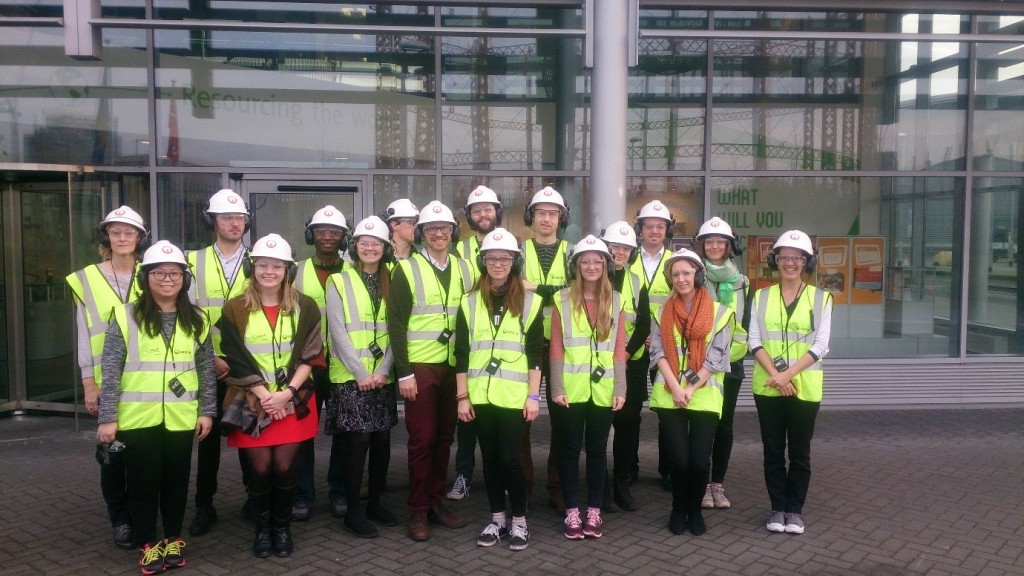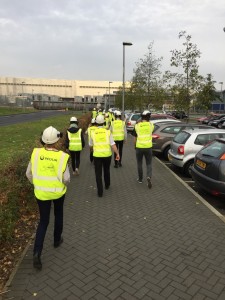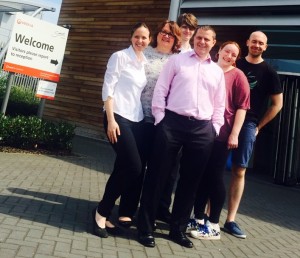by Wendela Schim van der Loeff
On Friday morning, the King’s Sustainability Team and its Champions visited Veolia’s Integrated Waste Management Facilities (IWMF) in Southwark. Veolia is our waste contractor who services all of Southwark and many other parts of London. Operating under a circular economy business principle, Veolia seeks to turn waste back into resources that power our homes and industry. Waste to landfill is removed from the waste process and replaced by recycling or energy from waste. In smart societies of the future, Veolia sees production and consumption going hand-in-hand and one person’s waste will become another’s resource. Its aim is to further incorporate sustainable thought into the waste process, where the resources sector can make a realistic 10% contribution to the UK’s 2027 carbon reduction targets, through the decarbonisation of energy and its circular economy.
Upon arrival at the Veolia site, the team was given an overview of the waste manager’s practices and operations within the waste and energy sectors, across London. Located in Southwark, this facility is able to process all of Southwark’s household waste and recyclables, helping to significantly improve recycling rates and reduce the impact that the borough’s waste has on the environment. The facility enables Veolia to divert the majority of Southwark’s waste away from landfill and provides energy to local social housing. We got to see the processes our recycles and general waste all go through as well as all the sustainability work Veolia does.
The facility comprises of 5 major areas:
- The Materials Recovery Facility (MRF) sorts recyclables collected from households.
- The Mechanical Biological Treatment (MBT) facility turns black bag waste into a fuel for energy recovery.
- The Reuse and Recycling Centre (RRC) supports waste prevention through a variety of reuse schemes.
- The Transfer Station (TS) provides a collection point for any materials that cannot be treated on site.
- The Recycling Discovery Centre (RDC) offers educational opportunities designed especially for primary school children.
The Southwark treatment facility operates across a number of waste types. At the MRF, waste is split between cardboard, glass, juice cartons and more. 50% of recycled waste is sold to brokers in the UK and the other 50% is sold abroad.
The majority of King’s waste is taken for treatment by Veolia and it manages the majority of waste across London’s boroughs. How can King’s and its staff and students help mitigate waste from landfill and improve the value retained from waste, i.e. the recycling process?
– Those living in residences should be reminded what they can recycle (plastics, cardboard, glass, paper, tins, juice cartons). Batteries, clothing and electrical items can also be recycled at residences, but not in kitchen bins.
– During the sorting process, Veolia cannot take any risks with food contamination. This implies that when a pizza box is still intact and closed, it will not be recycled as there is a significant chance of it containing pizza leftovers. When you recycle your pizza boxes, make sure to flat pack them or take them apart.
– Remember that plastic carrier bags should not go in the recycling bin! They have to be picked out at the Materials Recovery Facility, as they could cause problems by getting stuck in the machinery. Drop them off at the designated plastic bag recycling point at your local supermarket instead.





